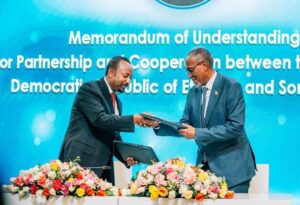By Staff Writer
NAIROBI — Somaliland President Muse Bihi Abdi said that the recent port access agreement that his breakaway government has signed with Ethiopia is strategic and will significantly enhance maritime security in the volatile Red Sea region.
The deal, signed in January, involves leasing land near the southern entrance to the Red Sea in exchange for formal recognition from Ethiopia,.
But according to Abdi, the accord is seen as a strategic effort to safeguard shipping routes frequently targeted by Houthi rebels.
“Ethiopia will build a naval military base and have commercial ships,” Bihi Abdi told the Financial Times, emphasizing that this collaboration will support international efforts to maintain the freedom of navigation in the Gulf of Aden and the Red Sea.
Somaliland, which declared independence from Somalia in 1991, has struggled for international recognition.

The recent memorandum of understanding with Ethiopia marks a pivotal step towards achieving this goal, according to Abdi.
“The historic memorandum… will provide us with a clear pathway towards international recognition,” he said from the capital, Hargeisa.
Ethiopia, landlocked since its 1993 split with Eritrea, views this agreement as a crucial opportunity to diversify its access to the sea, reducing its reliance on Djibouti.
However, the deal has faced opposition from Somalia, whose president firmly declared that no part of its territory would be ceded.
International reactions have been mixed.
While some see the agreement as a pragmatic solution to Ethiopia’s logistical challenges, others, including the U.S. and the EU, have expressed concerns about potential regional instability.
Ethiopia’s plans for the land around Berbera include building a port and establishing a fleet to counter maritime threats.
Economic implications for Somaliland are also substantial.
The region has already attracted $300 million in investment from Dubai-based DP World for the development of Berbera and its economic zone.
Full recognition could further unlock investment opportunities, transforming Somaliland’s $3.4 billion economy, the president said in the interview with FT.
Despite Somaliland’s relative stability and self-governance, it has yet to gain formal recognition from any country. This deal with Ethiopia, while controversial, represents a significant step in its ongoing quest for international legitimacy.
Bihi Abdi remains optimistic about the future, stating,
“We’ve been working towards international recognition of our independent status for over 33 years. We’re ready.”
For Somaliland, this agreement is not just about regional security but a long-awaited opportunity to cement its place on the world stage.
© All East Africa


![Somaliland President Muse Bihi Abdi. [Photo: Courtesy]](https://www.alleastafrica.com/wp-content/uploads/2024/05/qzmtjulg2uvep3bg5fd5fef3cbca3.jpg)
